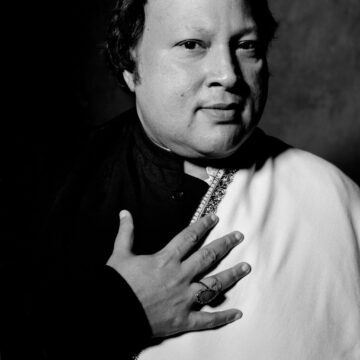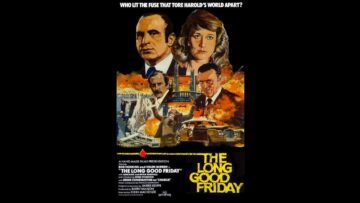Adwait Patil in the New York Times:
 On Oct. 27, 2022, the photojournalist Saiyna Bashir was interviewing the musician Michael Brook in his Los Angeles studio when she learned something that prompted an urgent text to Zakir Thaver, her filmmaker colleague in Pakistan:
On Oct. 27, 2022, the photojournalist Saiyna Bashir was interviewing the musician Michael Brook in his Los Angeles studio when she learned something that prompted an urgent text to Zakir Thaver, her filmmaker colleague in Pakistan:
“New undiscovered album.”
Bashir and Thaver were producing an upcoming documentary called “Ustad” about Nusrat Fateh Ali Khan — the celebrated Pakistani singer who died in 1997 at age 48 — and Brook, the silver-haired musician whose ambient work has crossed paths with Daniel Lanois, Brian Eno and Michael Mann, had just revealed that he was working on an unreleased Khan song.
It was part of “Chain of Light,” an album Brook recorded with Khan at Peter Gabriel’s Real World Studios in England more than three decades ago. “Ya Gaus Ya Meeran,” the track in question, was an unreleased Khan qawwali, a song based on the devotional poetry of Sufism, a mystical branch of Islam.
More here.
Enjoying the content on 3QD? Help keep us going by donating now.

 W
W How did we become ‘Indians’, ‘Pakistanis’ and ‘Bangladeshis’ after the two divisions of the subcontinent? Given that national identity was so fragile and contested before 1947, how did it become a matter so ‘natural’ after it? Or did it? Did nation-making projects succeed?
How did we become ‘Indians’, ‘Pakistanis’ and ‘Bangladeshis’ after the two divisions of the subcontinent? Given that national identity was so fragile and contested before 1947, how did it become a matter so ‘natural’ after it? Or did it? Did nation-making projects succeed? T
T In “
In “ A drug that slows aging may already be on the market.
A drug that slows aging may already be on the market. ABOUT TWO HOURS south of the grandiose architectural amalgam that is Zagreb lies the equally impressive natural wonder of Plitvice Lakes National Park, a network of waterfalls and lakes serenely carving its way through the lush limestone plain. The park, at the northeastern edge of Croatia’s largest and least-populated county, Lika-Senj, is one of the most popular tourist attractions in the region, and also the site of the first casualties of the succession of Balkan wars in the aftermath of Yugoslavia’s disintegration in the 1990s.
ABOUT TWO HOURS south of the grandiose architectural amalgam that is Zagreb lies the equally impressive natural wonder of Plitvice Lakes National Park, a network of waterfalls and lakes serenely carving its way through the lush limestone plain. The park, at the northeastern edge of Croatia’s largest and least-populated county, Lika-Senj, is one of the most popular tourist attractions in the region, and also the site of the first casualties of the succession of Balkan wars in the aftermath of Yugoslavia’s disintegration in the 1990s. N
N The number of global deaths directly attributable to antibiotic-resistant bacterial infections is forecast to rise from a record 1.27 million a year in 2019 to 1.91 million a year by 2050. In total,
The number of global deaths directly attributable to antibiotic-resistant bacterial infections is forecast to rise from a record 1.27 million a year in 2019 to 1.91 million a year by 2050. In total,  A
A S
S A
A Reading
Reading The novels recognized by major literary prizes have largely abandoned the present in favor of the past. Contemporary fiction has never been less contemporary.
The novels recognized by major literary prizes have largely abandoned the present in favor of the past. Contemporary fiction has never been less contemporary.